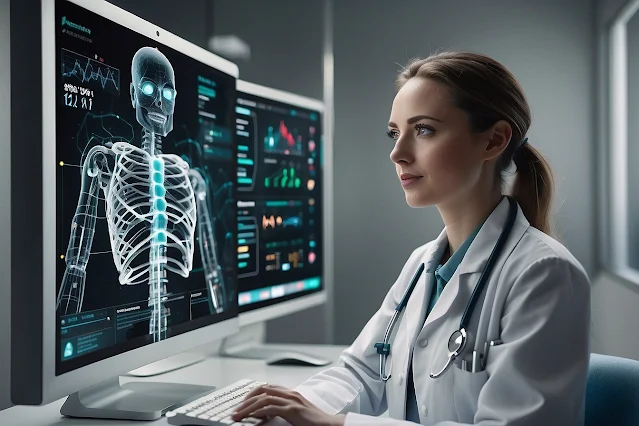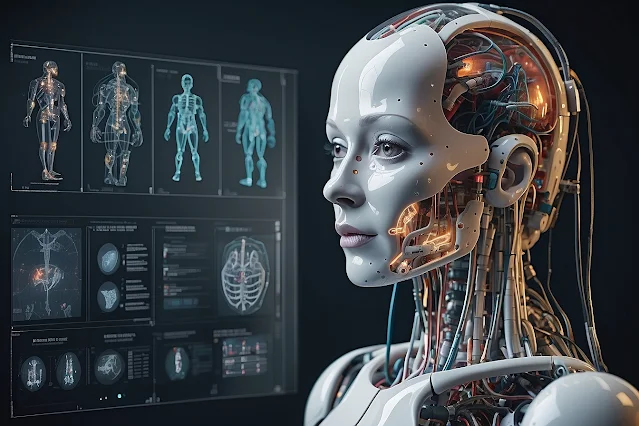The AI Revolution in Healthcare: It's Already Happening!
AI isn't just some far-off dream – it's already making a real difference in hospitals and clinics around the world. Here are a few ways AI is currently flexing its muscles:
- X-Ray Vision on Steroids: AI algorithms are analyzing medical images like X-rays and mammograms, helping doctors catch diseases earlier and with greater accuracy. Think of it as giving your doctor a superpowered eye for detail.
- 24/7 Patient Support: Chatbots powered by AI are providing patients with around-the-clock support. Need to schedule an appointment or ask a quick question? Your friendly AI assistant is there to help, freeing up doctors and nurses for more complex tasks.
- The Paperwork Slayer: Artificial Intelligence can streamline all those tedious administrative tasks like appointment scheduling, insurance claim processing, and medical record management. This frees up valuable time for medical professionals to focus on what they do best – caring for patients.
These are just a taste of the ways AI is transforming healthcare. But of course, with any powerful technology, there are challenges to address, like data privacy concerns and ensuring unbiased algorithms.
Advancements in Diagnostics: How AI is Revolutionizing Healthcare Diagnosis
In the fast-paced world of healthcare, timely and accurate diagnosis can be the difference between life and death. Fortunately, Artificial Intelligence (AI) is stepping up to the plate, revolutionizing the diagnostic process in ways we've never seen before. Let's delve into the fascinating world of AI-driven diagnostics and explore how it's reshaping the healthcare landscape.
AI: The Diagnostic Detective
Imagine having a medical Sherlock Holmes at your service—always ready to sift through vast amounts of data to uncover hidden clues and patterns. That's precisely what AI brings to the table in healthcare diagnostics.
By analyzing complex datasets including medical images, genetic information, and patient records, AI algorithms can spot subtle indicators of disease that may elude even the most seasoned healthcare professionals.
Faster, More Accurate Diagnoses
One of the most significant advantages of AI in diagnostics is its ability to deliver faster and more accurate diagnoses. With AI algorithms working tirelessly behind the scenes, healthcare providers can expedite the diagnostic process, leading to quicker treatment plans and improved patient outcomes.
Moreover, AI can assist in detecting rare or complex conditions that might otherwise be overlooked, ensuring that no stone is left unturned in the quest for a diagnosis.
Real-World Applications
The real-world applications of AI-driven diagnostics are already making waves in healthcare. From detecting tumors on medical images to identifying subtle changes in patient data indicative of disease progression, AI is proving its worth as a valuable diagnostic tool.
For example, AI-powered algorithms have been developed to analyze medical images such as X-rays, MRIs, and CT scans, assisting radiologists in identifying abnormalities with greater accuracy and efficiency.
Future Directions
As AI technology continues to evolve, the future of diagnostics holds even more promise. We can expect to see further advancements in AI algorithms, leading to improved diagnostic accuracy and expanded capabilities.
Additionally, the integration of AI with other cutting-edge technologies such as genomics and wearable devices will open up new possibilities for personalized and proactive healthcare.
Challenges and Considerations
Of course, with great power comes great responsibility. As we embrace AI-driven diagnostics, it's essential to address potential challenges and considerations. These may include issues related to data privacy, algorithm bias, and regulatory compliance.
By navigating these challenges thoughtfully and responsibly, we can ensure that AI-driven diagnostics continue to enhance patient care while upholding the highest standards of ethical practice.
Personalized Patient Care: How AI is Tailoring Healthcare to You
In the ever-evolving landscape of healthcare, one size does not fit all. Each patient is unique, with individual needs, preferences, and health conditions. Enter Artificial Intelligence (AI), the game-changer in personalized patient care.
Let's embark on a journey to discover how AI is reshaping healthcare delivery, putting you at the center of your own care plan.
Empowering Proactive Healthcare
Imagine having a healthcare companion who knows you inside out, predicting your health needs before they arise. With AI-powered predictive analytics, personalized patient care is taking a giant leap forward. By analyzing your health data in real-time, AI algorithms can identify patterns and trends, flagging potential issues before they escalate. From suggesting lifestyle changes to recommending preventive screenings, AI empowers you to take charge of your health proactively.
Tailored Treatment Plans
Gone are the days of one-size-fits-all treatment plans. With AI, your treatment plan is as unique as you are. By considering factors such as your medical history, genetic makeup, lifestyle, and even your preferences, AI algorithms can craft personalized treatment plans that optimize your health outcomes.
Whether it's adjusting medication dosages, scheduling follow-up appointments, or recommending complementary therapies, AI ensures that your care plan is tailored to your specific needs and circumstances.
Continuous Monitoring and Remote Care
But personalized patient care doesn't stop at the doctor's office. Thanks to AI-powered technologies like wearable devices and remote monitoring systems, healthcare is now available wherever you are. These devices keep a constant eye on your vital signs, alerting healthcare providers to any deviations from the norm. Whether you're at home, at work, or on the go, AI ensures that your health is always a top priority.
Breaking Down Barriers to Access
For many, accessing healthcare can be a challenge due to factors like geographical location, mobility issues, or socioeconomic status. AI is breaking down these barriers by democratizing access to care. With telemedicine platforms powered by AI, you can consult with healthcare providers from the comfort of your own home. AI chatbots are also available 24/7 to answer your health-related questions and provide guidance. By leveraging AI, healthcare is becoming more accessible and equitable for all.
Ethical Considerations and Trust
Of course, with great power comes great responsibility. As AI becomes increasingly integrated into healthcare, it's essential to address ethical considerations and build trust with patients. Transparency, privacy protection, and informed consent are paramount in ensuring that AI-driven personalized patient care remains ethical and patient-centered. By upholding these principles, we can foster a healthcare system that prioritizes your well-being above all else.
Precision Medicine and Disease Prevention: How AI is Pioneering Personalized Healthcare
In the quest for optimal health outcomes, one approach stands out: precision medicine. This revolutionary concept tailors medical treatment to the individual characteristics of each patient, offering targeted therapies and preventive measures like never before.
And at the forefront of this medical revolution is Artificial Intelligence (AI). Join us as we explore how AI is spearheading precision medicine and transforming disease prevention, one patient at a time.
- Decoding the Genetic Blueprint
At the heart of precision medicine lies the human genome—a vast treasure trove of genetic information waiting to be unlocked. With the help of AI, scientists and healthcare professionals can delve into this genetic blueprint, identifying specific genes associated with diseases and treatment responses.
AI algorithms analyze massive datasets with lightning speed, pinpointing genetic variations that may influence disease susceptibility, prognosis, and treatment outcomes.
- Personalized Treatment Paths
Armed with insights from genetic analysis, healthcare providers can chart personalized treatment paths tailored to each patient's unique genetic makeup. AI algorithms crunch the numbers, analyzing genetic data alongside clinical information to recommend the most effective therapies. From targeted cancer treatments to customized drug regimens, precision medicine ensures that patients receive interventions optimized for their individual biology, maximizing therapeutic efficacy while minimizing side effects.
- Early Detection and Intervention
But precision medicine isn't just about treating diseases—it's also about preventing them altogether. By leveraging AI-powered predictive analytics, healthcare providers can identify individuals at high risk of developing certain conditions long before symptoms appear. Armed with this knowledge, proactive interventions can be initiated to mitigate risk factors and prevent disease progression. From lifestyle modifications to targeted screening programs, precision medicine offers a proactive approach to healthcare that saves lives and reduces healthcare costs.
- The Promise of AI-Driven Genomics
AI-driven genomics is the cornerstone of precision medicine, offering unprecedented insights into the genetic underpinnings of health and disease. By combining AI's analytical prowess with cutting-edge genomic technologies, researchers can unravel the complexities of human biology with unprecedented speed and precision. From identifying novel drug targets to predicting treatment responses, AI-driven genomics holds the key to unlocking the full potential of precision medicine and revolutionizing healthcare as we know it.
Navigating Ethical and Regulatory Challenges
As with any transformative technology, precision medicine powered by AI raises important ethical and regulatory considerations. Ensuring patient privacy, informed consent, and equitable access to genetic testing are essential priorities.
Additionally, addressing concerns related to data security, algorithm bias, and the responsible use of genetic information is crucial to building trust and fostering widespread adoption of precision medicine.
Robotics and Surgical Innovations: The Rise of the AI-Powered Surgeon
The future of surgery is no longer confined to science fiction movies. AI-powered robotics is poised to revolutionize the operating room, ushering in an era of minimally invasive procedures, enhanced precision, and potentially improved patient outcomes.
The Rise of the Surgical Robot:
Imagine a surgical robot with incredible dexterity and unparalleled precision, guided by intelligent algorithms and assisting surgeons in performing complex procedures. This isn't a futuristic fantasy; surgical robots are already a reality in many hospitals worldwide. These robots boast several advantages:
- Enhanced Dexterity: Surgical robots can maneuver instruments with a level of precision and control that surpasses human capabilities, especially in minimally invasive procedures. This allows surgeons to operate in delicate areas with minimal disruption to surrounding tissues.
- Improved Visualization: Surgical robots are often equipped with high-resolution cameras that provide magnified views of the surgical field. This allows surgeons to visualize the anatomy in greater detail, leading to improved decision-making during surgery.
- Reduced Tremor: Tiny tremors in a surgeon's hands can be magnified during delicate procedures. Surgical robots eliminate this issue, providing a steadier platform for instrument manipulation.
The Benefits of AI-powered Surgical Robotics:
- Minimally Invasive Surgery: Surgical robots enable minimally invasive procedures, resulting in smaller incisions, faster recovery times, and reduced pain for patients.
- Improved Surgical Outcomes: The enhanced precision and control offered by robots can lead to improved surgical outcomes, including reduced complications and a higher success rate for complex procedures.
- Remote Surgery: Advancements in telemedicine and robotics could pave the way for remote surgery. Imagine a surgeon performing a complex operation on a patient located far away, with the assistance of a robot at the bedside.
The Future of Surgical Robotics:
The integration of AI with surgical robots holds immense potential for the future. Imagine robots that can not only assist surgeons but also learn and adapt during surgery, offering real-time feedback and recommendations. Additionally, advancements in AI could lead to the development of autonomous surgical robots capable of performing specific procedures with minimal human intervention.
Ethical Considerations and the Human Touch:
While AI-powered surgical robots offer exciting possibilities, it's crucial to emphasize the irreplaceable role of human surgeons. The human touch, experience, and decision-making skills of surgeons will remain paramount, even with the assistance of robots. The focus should be on collaboration between humans and AI, leveraging the strengths of both to achieve the best possible outcomes for patients.
By embracing AI-powered robotics responsibly, we can usher in a new era of surgical innovation, leading to a future where complex procedures are performed with greater precision, minimal invasiveness, and ultimately, improved patient care.



